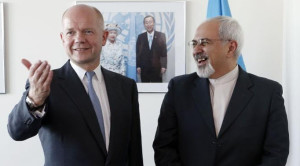October 11-13
Britain and Iran each announced Tuesday that the two countries have reached an agreement to start a gradual and step-by-step effort to resume diplomatic ties.

The first step is a very odd and perhaps unique-in-history agreement to appoint non-resident charges d’affaires—that is, each country will name an official, a charge d’affaires, to be in charge of relations with the other but each will live in his own country. The two will meet periodically to discuss further steps to improving relations.
The announcements didn’t say where the charges would meet—but presumably not in Tehran. The odd arrangement suggests Britain still doesn’t trust Iran enough to feel safe about sending any of its diplomats to Tehran at this time.
The two embassies have been closed since November 2011 when a mob overran the British embassy and ransacked it. Britain then withdrew its own staff and booted out Iranian diplomats.
UK Foreign Secretary William Hague told the House of Commons about the new arrangement Tuesday. Hague met with Iranian Foreign Minister Mohammad-Javad Zarif twice on the sidelines of the UN General Assembly in New York last month, and they spoke on the telephone Monday, during which they nailed down the odd arrangement.
“I’ve made very clear to Zarif that we are open to more direct contact and further improvements in our bilateral relations,” Hague told the House.
“We have, therefore, agreed that both our countries will now appoint a non-resident charge d’affaires tasked with implementing the building of relations, including interim steps on the way towards the eventual reopening of both our embassies, as well as dialogue on other issues of mutual concern.”
The British minister said the tone of discussions with the Iranians had changed since President Rohani’s election in June, but added: “We must not underestimate the difficulties ahead.”
“We must test the Iranian government’s sincerity to the full, and it is important that our channels of communication are open for that,” Hague said.
“Building up trust and cooperation is going to be necessary before we can say, yes, we are opening up the embassy again.”
Oman currently represents Iranian interests in Britain, while Sweden has taken on similar responsibilities in Tehran.
Hague said: “It is understood on both sides that, given this history, progress in our bilateral relationship needs to proceed on a step-by-step and reciprocal basis.”
